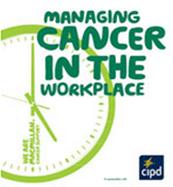3rd of returning cancer sufferers face workplace discrimination

‘Employers need better understanding of impact of cancer treatment’
Employees returning to work after recovering from cancer are facing rising levels of discrimination, with one in-10 feeling so harassed they are thinking of leaving their job entirely, a new study has revealed.
The shock finding comes from the latest research by Macmillan Cancer Support in conjunction with YouGov.
After polling 168 cancer sufferers (all of whom had returned to work in the last five years), it found more than a third (37 per cent) had experienced some sort of discrimination from either their employer or their colleagues.
Worryingly, this figure has leapt from just under a quarter (23 per cent), in a less than three years, with 8 per cent of recovered cancer sufferers saying they’d been given unfair workloads, and a further 8 per cent saying they’d been passed over for promotion.
Ciarán Devane, chief executive at Macmillan Cancer Support, said the findings clearly revealed employers needed a better “understanding of cancer and how the effects of treatment may impact on people returning to work”.
She added: “Going back to work after treatment can be very isolating, especially if someone has been off for a while and has lost confidence or contact with colleagues. As our population grows and ages, and the retirement age rises, cancer will become an increasingly common issue for employees and their managers. It’s vital they are equipped to help people with cancer stay in work.”
According to the study, 13 per cent of employees said their bosses did not make reasonable changes to enable them to do their job. This is despite them being legally required to do so under the 2010 Equality Act.
Paul (name changed) said these issues were all too familiar. In 2010 he was diagnosed with blood cancer. He said: “When I told my boss I’d been diagnosed with cancer and asked to have some time off for treatment, I was given the sack. They said they couldn’t employ someone who was not a 100 per cent committed. It was a shock as I had a very successful career, and a fulfilling life.”
“I took them to an employment tribunal through a solicitor. But it was costing so much I had no money left to fight for my legal rights. I was paid a financial settlement. It wasn’t a lot, and it’s gone just trying to keep the bills paid.”
Paul is not alone. Macmillan finds 7 per cent of returnees reported that their bosses either implied or suggested they would be better off not continuing to work.
More than 100,000 people of working age are diagnosed with cancer each year in the UK, and Macmillan Cancer Support is calling for employers to fulfill their obligations to people returning to work after cancer treatment.
The charity is also calling on the government to address the lack of specialist back-to-work services for cancer patients in the UK, such as counselling, physiotherapy and occupational therapy.
